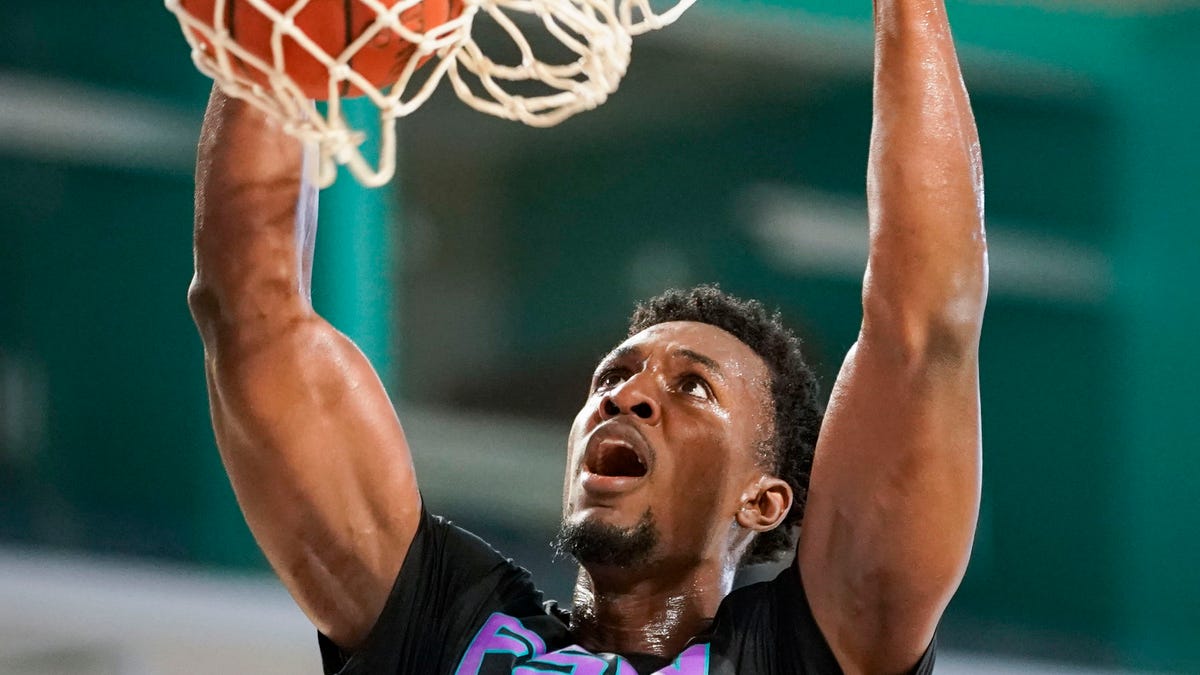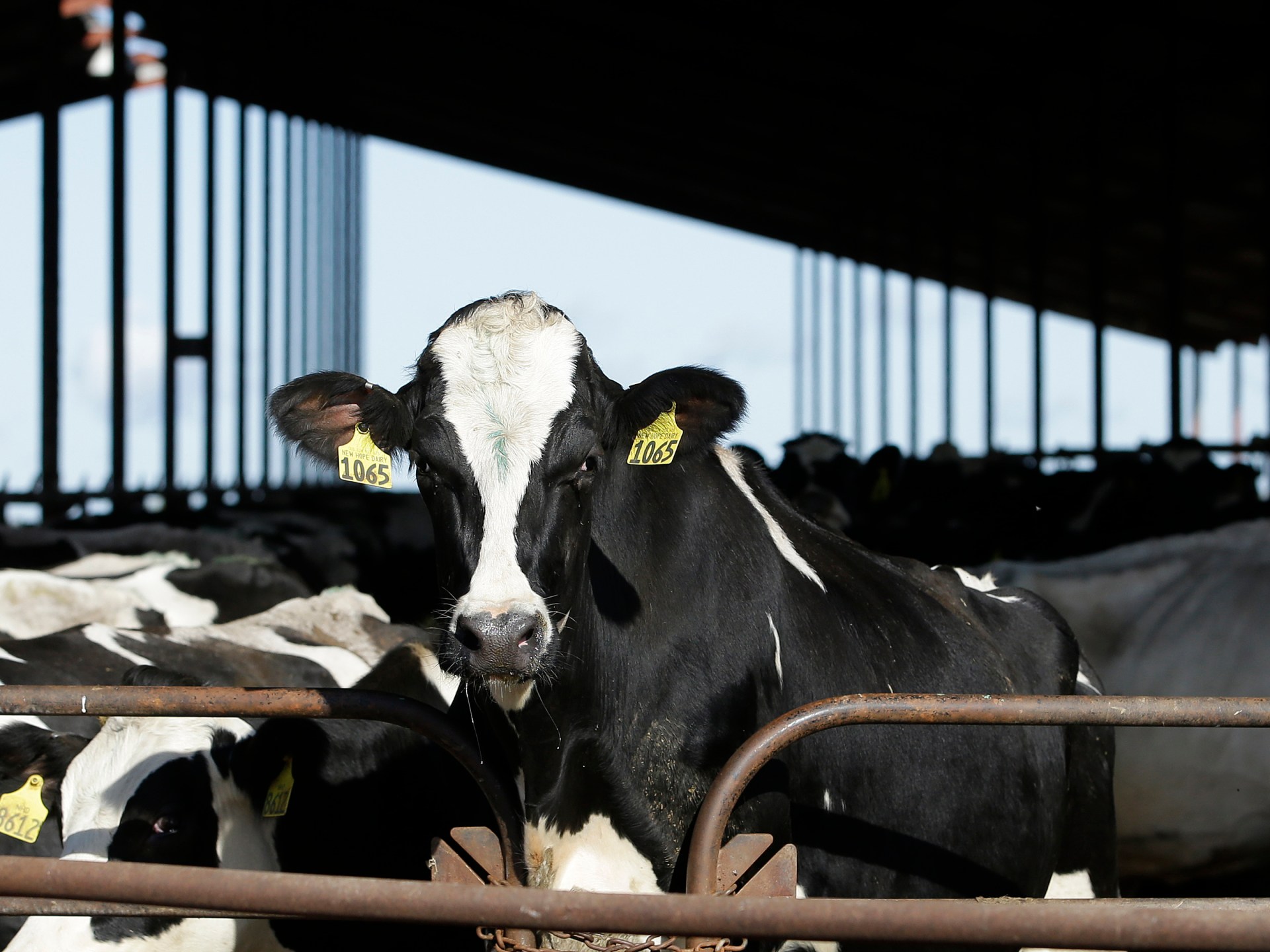Missouri
Farmers optimistic 2024 will be a good year for agriculture in Missouri

KANSAS CITY, Mo. — Missouri farmers are looking ahead and feeling good about how the year will unfold for their businesses.
A new survey from the Missouri Farm Bureau found 40% of respondents were more optimistic than a year ago about the future of agriculture in the state.
“I think farmers are eternal optimists,” said Matt Moreland, a fourth-generation farmer in Harrisonville. “We’re always, ‘next year will be better, next year will be better.’ And so this is the start of the next year.”
About 41% of those surveyed noted no change in their outlook, which leaves less than 20% feeling more pessimistic about 2024.
Moreland is one of the optimists.
He raises cattle and plants corn, beans and even sunflowers.
“We kind of do a little bit of everything,” he said.
When it comes to farm trends, they’ve seen everything.
“We’re used to kind of riding a wave,” Moreland said. “Things have been tough the last few years kind of as a whole for agriculture. And things are maybe, starting to kind of turn around and look a little bit better.”
Inputs, which include feed, fuel, and fertilizer make the biggest waves.
The pandemic, drought, and the war in Ukraine played a role in wreaking havoc on the prices of all three items.
But now, suppliers have largely gotten around that problem.
“We have made it through some challenging times,” Moreland said. ” We made it through those crazy, high fertilizer prices. A lot of us had huge shortfalls on our hay crops. We had to make some adjustments, maybe sell a few cows, but we’re all still here.”
Perhaps the biggest indicator things are looking up is more than 90% of farmers recommend future generations follow in their footsteps.
“Just makes you feel good that farmers like and feel secure enough in what they’re doing to want their families to come back and their kids to come back and be part of it,” Moreland said. “That gave me the biggest hope, the biggest smile.”

Missouri
Missouri Senate avoids impasse over budget to make constitutional deadline • Missouri Independent

With passage of a $51.7 billion budget Thursday, the Missouri Senate beat the constitutional deadline by 24 hours after a debate that left Republican leaders exhausted but satisfied.
A 41-hour filibuster stalled all work last week – including planned budget debates on a committee-passed spending plan. To make the deadline, Senate Appropriations Chairman Lincoln Hough began negotiating with House Budget Committee Chairman Cody Smith last week on what should be removed from the Senate plan, and what the House would accept from it, to get bills that would pass both chambers.
The 17 spending bills passed during Thursday’s eight-hour debate – one for the remainder of the current fiscal year, the rest for the year that begins July 1 – will be up for a vote in the House on Friday.
But even before the Senate began voting, Gov. Mike Parson said the rushed work means his budget office hasn’t had time to review it. He told reporters he will not leave large unfunded needs for his successor to cover.
The budget needs to have the money required for the coming year because he leaves office in January, Parson said.
“We’re not going to do the largest supplemental (budget) in our state’s history,” Parson said. “I just don’t plan on doing that because all you’re doing then is just passing it on to the other legislators that are going to be coming in with the next governor.”
Hough had to navigate a Senate that has been dysfunctional all year because of Republican factional fighting in order to put the upper chamber’s stamp on a spending plan that arrived from the House a week later than normal.
Most of the debate on Thursday was consumed by members of the Missouri Freedom Caucus, who argued the budget spent too much, circumvented the regular process and gave legislators little time to scrutinize it.
Hough also had to endure criticism that delays in getting the budget on the Senate floor put him in the weakest position for negotiations with the House of any recent appropriations chairman.
“This was begging by the Senate appropriations chair to the House chair to take a budget to avoid a special session,” said Sen. Bill Eigel a Weldon Spring Republican and candidate for governor. “The Senate chair realized he had no leverage.”
Hough, a candidate for lieutenant governor, defended the budget he crafted during intense talks with Smith.
“This budget is not built around the mentality you have, which is just to beat somebody into submission,” he said to Eigel.
The total budget is about halfway between the $50.7 billion spending plan passed in the House last month and the $53 billion proposal Hough and the Senate Appropriations Committee approved. It is also about $1 billion less than the budget proposed in January by Parson.
The bills call for spending $15.3 billion in general revenue, with $14.6 billion for agency operations. That is about $287 million more than Parson proposed and $424 million more than the House-approved budget.
The budget for the current fiscal year, including the supplemental appropriations approved in the Senate, is $53.5 billion, with $15.8 billion in general revenue spending.
The budget includes a 3.2% pay raise for state employees, a 3% boost in funding for state colleges and universities and $727.5 million for improvements to Interstate 44, half from general revenue and half from new state debt.
Most of the money Hough added to the budget to boost salaries at agencies that provide support for adults with developmental disabilities did not survive negotiations. Instead of a $325 million boost to those programs to allow agencies to pay $17 an hour, the increase was pared back to $74 million. Whether that will allow any pay increases was unclear in the hours after the Senate votes.
There were seven to nine Republican votes against all but two of the bills. The five members of the Freedom Caucus were often joined in opposition to the spending bills by Sens. Mary Elizabeth Coleman of Arnold, who is running for secretary of state, Jill Carter of Joplin, who quit the Freedom Caucus last week, and Mike Moon of Ash Grove.
That left 15 to 17 members of the Republican majority in favor of the bills, meaning none of the spending bills would have passed without the help of Democrats.

Senate Minority Leader John Rizzo was quick to note that votes from his caucus made the difference.
“They needed our votes on every single bill outside of two, and they even voted against the agriculture budget, which was pretty interesting for us,” Rizzo said. “ So Ag funding was propped up by Democrats this year, so the agricultural community, your welcome. Thank Democrats.”
Prior to the debate, members of the Freedom Caucus demanded that general revenue spending not exceed the projected revenue for the coming year of $13.2 billion. Hough insisted that there is enough money in construction and other projects, as well as in agency funding designated as one-time appropriations, to meet that.
The difference between the projected revenue and the planned spending will come from a massive surplus that has accumulated in the treasury. In all funds that can be spent like general revenue, it is about $6.4 billion.
During debate, Eigel said the surplus should not be used to balance the budget.
“Balance means that the revenues coming in equal the revenues going out,” Eigel said. “Cash in your savings account is not a revenue item.”
The Missouri Constitution makes it clear that accumulated surpluses can be included in the budget plan.
Demanding a budget target regardless of other resources or the needs of the state is an argument designed to win political points, not govern responsibly, Rizzo said to reporters after the budget debate.
He said he expects Parson to eventually call a special session to add money so programs can operate through the year.
“Some of the Freedom Caucus members were pretty insistent on getting to a certain number,” Rizzo said, “and I think the way that they got to that certain number will probably make sure that there’s a special session sometime in the future, maybe in the fall.”
Missouri
Federal court rules Missourians were illegally denied food aid by the state • Missouri Independent

A federal judge ruled Thursday that Missouri’s social services agency violated the law in the way it has administered its food assistance program.
U.S. District Court Judge M. Douglas Harpool ruled that the state’s practices — including long call center wait times and a lack of accommodations for those with disabilities — violate the laws governing the federal Supplemental Nutrition Assistance Program and the Americans with Disabilities Act.
The Missouri Department of Social Services’ call center issues ultimately denied eligible Missourians meaningful access to benefits.
“While call wait times fluctuate and have shown some improvement, the record demonstrates too little progress,” Harpool wrote. “Consequently, Missourians who suffer food insecurity have been forced to either go hungry or seek alternative sources of food when their applications are denied.”
In February 2022, a federal lawsuit was filed against the social services department arguing the state’s “dysfunctional” call center deprives eligible Missourians of SNAP benefits, more commonly known as food stamps.
‘Broken system’: Call center backlogs impede Missouri families seeking food assistance
Plaintiffs described subsisting on little food while using up prepaid phone minutes waiting on hold for an interview, and, due to disability, struggling to understand the application forms but being unable to get through the call center for help.
An interview is required to sign up for or recertify SNAP benefits.
Without interviews, SNAP applications and renewals are automatically denied after 30 days — even if applicants have tried and been unable to get through. Around half of all SNAP denials in the state are due to failure to complete an interview, according to data obtained in litigation. The average call center wait time for the SNAP interview line, as of late last year, The Independent found, was over an hour.
“The high percentage of denials based on failure to interview is a direct consequence of the failed administration of defendant’s SNAP program,” Harpool wrote in his order.
“These denials are not based on the applicant’s eligibility but on the inadequacies of [the Department of Social Services’] process,” he wrote.
The lawsuit was filed by New York-based National Center for Law and Economic Justice, Legal Services of Eastern Missouri and Stinson LLP, on behalf of individual low-income Missourians and the advocacy group Empower Missouri.
“Today’s decision is a vindication of the rights of Missourians,” said Katharine Deabler-Meadows, attorney with the National Center for Law and Economic Justice.
“The Court has recognized the immense harm that DSS is causing to people who depend on SNAP to feed themselves and their families,” she said. “We are excited that DSS will now have to implement systems that ensure all Missourians can access SNAP.”
GET THE MORNING HEADLINES DELIVERED TO YOUR INBOX
The decision orders the social services agency to come into compliance with federal SNAP law and the Americans with Disabilities Act, and outlines several steps the agency must take, under the court’s supervision.
The steps the state must follow, as outlined in the order include:
- submitting a report with specific changes it will make to comply with the law within 30 days;
- filing monthly reports with the court with detailed data on SNAP applications and wait times, and filing that report with several members of Missouri state government outlined in the order;
- submitting a proposed plan of action and timeline of implementation “to address shortcomings in the administration of SNAP as identified” within 90 days, including a reduction in call wait times and denials based on failure to receive an interview and compliance with the ADA.
After the state complies with the order, the court “will determine what, if any, further actions, orders, remedies, or proceedings are appropriate,” Harpool wrote.
Harpool has been candid in previous hearings about his concerns over the state’s progress since the lawsuit was first filed.
“I continue to be amazed that it’s been since this case started,” he said in a January motion hearing, “that the state’s whole focus is how can we avoid liability rather than how can we get these benefits to our citizens.”
Hardin Haynes, the attorney representing DSS, rejected that characterization, according to court transcripts.
“The whole time this has been going on,” he said in the January hearing, “DSS has been doing what it can to increase its ability to do interviews throughout this process. That has never stopped.”
A spokesperson for the Department of Social Services did not immediately respond to a request for comment.
DSS has previously said it is doing all it can to hire more staff, grant overtime, move to automate assistance and contract with private call centers.
Agency leaders pointed to resource issues and challenges getting more staff as it requested $4 million this year for a “call center bot” to increase automation and reduce the need for staff on the general call center line.
Missouri
Missouri State basketball, Cuonzo Martin to add Morgan State transfer Allen Udemadu

Cuonzo Martin press conference after Missouri State reintroduction
Cuonzo Martin takes questions from the media following his introductory press conference on Monday, April 1, 2024, at Great Southern Bank Arena.
Morgan State transfer Allen Udemadu will transfer to Missouri State and play for Cuonzo Martin, according to national college basketball reporter Jeff Goodman.
Udemadu is a 6-foot-10 forward who averaged 8.4 points, 6.7 rebounds and 0.9 assists per game in his lone season of Division I basketball. He has one year of eligibility.
Udemadu started his collegiate career at Des Moines Area Community College before playing a year at Florida SouthWestern State.
At Florida SouthWestern State, he played in 24 games, averaging 4.5 points and 3.3 rebounds while shooting 59% from the field. He was a 60% shooter at Morgan State and never attempted a shot from deep.
More: Missouri State basketball, Cuonzo Martin add commit from Austin Peay transfer Dez White
More: Michael Osei-Bonsu becomes latest commit to Missouri State basketball, Cuonzo Martin
The Lagos, Nigeria, native had 10 games last season in which he blocked two or more shots. His best scoring game came on a road trip to Coppin State where he scored 25 points and grabbed seven boards. He recorded seven double-doubles including an 18-point, 17-rebound game at NJIT.
Udemadu’s addition gives Martin eight commitments to his overhauled roster since taking over Missouri State in late March. He has at least two scholarships to fill before the 2024-25 season.
-

 Politics1 week ago
Politics1 week agoThe White House has a new curator. Donna Hayashi Smith is the first Asian American to hold the post
-

 World1 week ago
World1 week agoTurkish police arrest hundreds at Istanbul May Day protests
-

 News1 week ago
News1 week agoPolice enter UCLA anti-war encampment; Arizona repeals Civil War-era abortion ban
-

 Politics1 week ago
Politics1 week agoAdams, NYPD cite 'global' effort to 'radicalize young people' after 300 arrested at Columbia, CUNY
-

 News1 week ago
News1 week agoVideo: Police Arrest Columbia Protesters Occupying Hamilton Hall
-

 News1 week ago
News1 week agoSome Republicans expected to join Arizona Democrats to pass repeal of 1864 abortion ban
-

 Politics1 week ago
Politics1 week agoNewsom, state officials silent on anti-Israel protests at UCLA
-
)
) Movie Reviews1 week ago
Movie Reviews1 week agoThe Idea of You Movie Review: Anne Hathaway’s honest performance makes the film stand out in a not so formulaic rom-com
:quality(70)/cloudfront-us-east-1.images.arcpublishing.com/adn/EHTKI2HVEEQIEPURGDLCGK4UNQ.jpg)
















